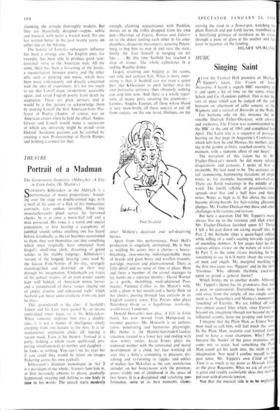THEATRE
Portrait of a Madman
COFIELD'S Khlestakov at the Aldwych is a aperformance of manic proportions: bound- ing over the stage on double-jointed legs, with a twirl of his cane or a flick of his immaculate coat-tails, eyes sunken, invisible, blind, tiny moustachio-curls glued across his furrowed cheeks, he is at once a music-hall toff and a man possessed. His voice is a weird and- special concoction, at first hearing a cacophony of jumbled sounds unlike anything one has heard before. Gradually, as the ear becomes accustomed to them, they sort themselves out into something which must originally have emanated from Gogol's small-time clerk, dreaming of grand soirees in his shabby lodgings: Khlestakov's version of the languid, braying tones used by the Gussie Fink-Nottles of his day, strangely transmogrified and distorted on their way through his imagination. Underneath are traces of his genteel origins. of an even cruder accent kept well hidden, of American movie heroes and a groundswell of those `voices singing out of empty cisterns and exhausted wells' which Scofield can never quite eradicate from any part he plays.
This groundswell is the clue: if Scofield's Timon and his Lear were guided by an insane undivulged inner logic, so is his Khlestakov. When someone surprises him into a double- take, it is not a matter of intelligence slowly creeping from one feature to the next. It is in- stantaneous; animation clicks off, leaving a vacant mask. Even at his busiest—lionised at a party, holding a whole room spellbound, pro- posing simultaneously to mother and daughter— he looks at nothing. You can't see his eyes but if you could they would be intent on images flickering across his own eyeballs.
Khlestakov's drunken monologue in Act 2 is a paradigm of the whole: listeners hem him in, at first nervously anxious to please, gradually hypnotised, swaying and shifting as one body in time to his words. The speech starts modestly enough, claiming acquaintance with Pushkin, moves on to the trifles dropped from his own pen—Marriage of Figaro, Romeo and Juliet— on to the dukes jostling each other in his ante- chambers, desperate messengers, scouring Peters- burg to beg him to step in and save the state, finally the Tsar himself is hanging on his lips. . . . By this time Scofield has reached a state of trance. The sthole culminates in a • reeling, Bacchic dance.
Gogol, straining and bulging at the seams, can only just contain him. What is more inter- esting is that, if Scofield can use even a genre part like Khlestakov to push further into his own particular territory, then obviously nothing can stop him now. And there is a whole reper- toire of manic parts awaiting his attentions- Leontes, Angelo, Faustus, all those whose blood is very snow-broth, all those outcast or cut off from society; on the one hand. Oedipus. on the
Paul Scofield other Moliere's deceived and sell-deceiving heroes.
Apart from this performance. Peter Hall's production is singularly uninspired. He is best at welding his actors into a chorus—a heavy- breathing, slow-moving indistinguishable mass of beards and giant boots and woollen trousers, porridge, maroon and plum-coloured. There is little detail and no sense of time or place. Here and there a member of the crowd manages to lay hands on a separate identity—David Warner as a gentle, shambling, mud-splattered Post- master; Patience Collier as the Mayor's wife, with a plum in her mouth and a hectic flush on her cheeks, peering through lace curtains in an English country town: Eric Porter, who plays Petersburg Osiip as a lugubrious, work-shy, world-weary Londoner.
Donald Howarth's new play, A Lily in Little India, has now moved from Hampstead to roomier quarters. Mr. Howarth is an authori-: tative. penetrating and humorous playwright. His theme is the Hamlet-Gertrude-Claudius situation, treated in a lower key and ending with slow wintry smiles. Jessie Evans plays the widowed mother with the emotional and moral development of a child, her face working all, over like a baby's, crumpling in pleasure, dis solving and re-forming in ripples and eddies of malice. Ian McLellan as the son, unwelcome intruder on her honeymoon with the postman; grows visibly out of childhood in the space of two hours. It is a disciplined and satisfying per formance, some of its best moments silent:.
stirring the mud in a flower-pot, watching his plant flourish and put forth leaves, transfixed in a horrifying grimace of revulsion as he stares through a pane of glass at his mother and her lover in pyjamas on the landing.
HILARY SPURLING


































 Previous page
Previous page